Campus/People
-
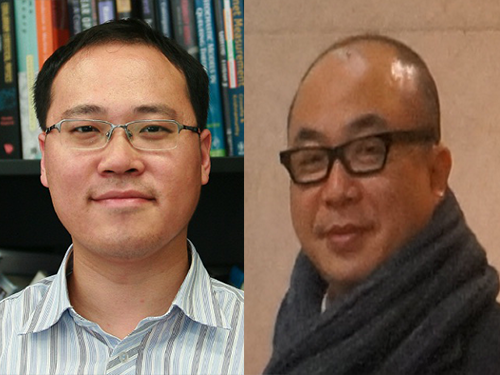 KAIST Researchers Receive the 2016 IEEE William R. Bennett Prize
A research team led by Professors Yung Yi and Song Chong from the Electrical Engineering Department at KAIST has been awarded the 2016 William R. Bennett Prize of the Institute of Electrical and Electronics Engineers (IEEE), which is the most prestigious award in the field of communications network. The IEEE bestows the honor annually and selects winning papers from among those published in the past three years for its quality, originality, scientific citation index, and peer reviews.
The IEEE award ceremony will take place on May 24, 2016 at the IEEE International Conference on Communications in Kuala Lumpur, Malaysia.
The team members include Dr. Kyoung-Han Lee, a KAIST graduate, who is currently a professor at Ulsan National Institute of Science and Technology (UNIST) in Korea, Dr. Joo-Hyun Lee, a postdoctoral researcher at Ohio State University in the United States, and In-Jong Rhee, a vice president of the Mobile Division at Samsung Electronics. The same KAIST team previously received the award back in 2013, making them the second recipient ever to win the IEEE William R. Bennett Prize twice.
Past winners include Professors Robert Gallager of the Massachusetts Institute of Technology (MIT), Sachin Katti of Stanford University, and Ion Stoica of the University of California at Berkeley.
The research team received the Bennett award for their work on “Mobile Data Offloading: How Much Can WiFi Deliver?” Their research paper has been cited more than 500 times since its publication in 2013. They proposed an original method to effectively offload the cellular network and maximize the Wi-Fi network usage by analyzing the pattern of individual human mobility in daily life.
2016.05.02 View 13909
KAIST Researchers Receive the 2016 IEEE William R. Bennett Prize
A research team led by Professors Yung Yi and Song Chong from the Electrical Engineering Department at KAIST has been awarded the 2016 William R. Bennett Prize of the Institute of Electrical and Electronics Engineers (IEEE), which is the most prestigious award in the field of communications network. The IEEE bestows the honor annually and selects winning papers from among those published in the past three years for its quality, originality, scientific citation index, and peer reviews.
The IEEE award ceremony will take place on May 24, 2016 at the IEEE International Conference on Communications in Kuala Lumpur, Malaysia.
The team members include Dr. Kyoung-Han Lee, a KAIST graduate, who is currently a professor at Ulsan National Institute of Science and Technology (UNIST) in Korea, Dr. Joo-Hyun Lee, a postdoctoral researcher at Ohio State University in the United States, and In-Jong Rhee, a vice president of the Mobile Division at Samsung Electronics. The same KAIST team previously received the award back in 2013, making them the second recipient ever to win the IEEE William R. Bennett Prize twice.
Past winners include Professors Robert Gallager of the Massachusetts Institute of Technology (MIT), Sachin Katti of Stanford University, and Ion Stoica of the University of California at Berkeley.
The research team received the Bennett award for their work on “Mobile Data Offloading: How Much Can WiFi Deliver?” Their research paper has been cited more than 500 times since its publication in 2013. They proposed an original method to effectively offload the cellular network and maximize the Wi-Fi network usage by analyzing the pattern of individual human mobility in daily life.
2016.05.02 View 13909 -
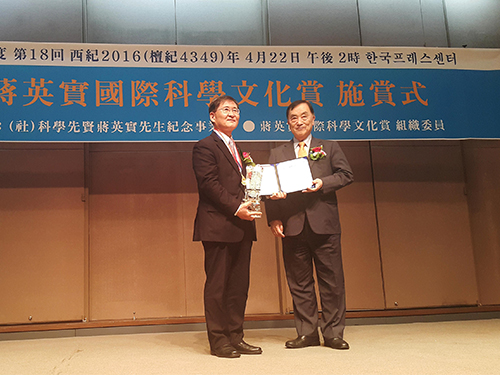 President Sung-Mo Kang Receives the Jang Young-sil Award
On April 22, 2016, President Sung-Mo Kang of KAIST became the 18th recipient of the Jang Young-sil Award. The Jang Young-sil Memorial Association of Korea awarded the prize to him at the Korea Press Center in Seoul.
The award, created in 1999 by the Jang Young-sil Memorial Association of Korea to recognize those scientists who have made significant contributions to the development of Korean science and technology, is bestowed annually.
Jang Young-sil was a highly regarded Korean scientist and astronomer during the Joseon Dynasty (1392-1897), whose major inventions were a sundial, a water clock, and a rain gauge.
In the award ceremony, the association said that President Kang had devoted much of his life to the advancement of science education and research, globally and nationally, as an educator, scholar, administrator, and researcher and that his accomplishments have served as an example of leadership for young scientists.
In his acceptance speech, President Kang expressed his gratitude for the award and said,
“I am honored to receive an award in the name of our great ancestor scientist Jang Young-sil who, despite his low birth as a peasant, rose to become an excellent scientist and built a remarkable legacy of science for Korea. While cherishing his spirit, creativity and grit, I will continue to working hard to foster outstanding scientists and engineers who are needed not only by Korea but also by the global community.”
In the photo, Dr. Gun-Mo Chung (pictured on the right), the former Minister of Science and Technology of Korea presents the Jang Young-sil Award to President Sung-Mo Kang (left).
2016.04.22 View 5784
President Sung-Mo Kang Receives the Jang Young-sil Award
On April 22, 2016, President Sung-Mo Kang of KAIST became the 18th recipient of the Jang Young-sil Award. The Jang Young-sil Memorial Association of Korea awarded the prize to him at the Korea Press Center in Seoul.
The award, created in 1999 by the Jang Young-sil Memorial Association of Korea to recognize those scientists who have made significant contributions to the development of Korean science and technology, is bestowed annually.
Jang Young-sil was a highly regarded Korean scientist and astronomer during the Joseon Dynasty (1392-1897), whose major inventions were a sundial, a water clock, and a rain gauge.
In the award ceremony, the association said that President Kang had devoted much of his life to the advancement of science education and research, globally and nationally, as an educator, scholar, administrator, and researcher and that his accomplishments have served as an example of leadership for young scientists.
In his acceptance speech, President Kang expressed his gratitude for the award and said,
“I am honored to receive an award in the name of our great ancestor scientist Jang Young-sil who, despite his low birth as a peasant, rose to become an excellent scientist and built a remarkable legacy of science for Korea. While cherishing his spirit, creativity and grit, I will continue to working hard to foster outstanding scientists and engineers who are needed not only by Korea but also by the global community.”
In the photo, Dr. Gun-Mo Chung (pictured on the right), the former Minister of Science and Technology of Korea presents the Jang Young-sil Award to President Sung-Mo Kang (left).
2016.04.22 View 5784 -
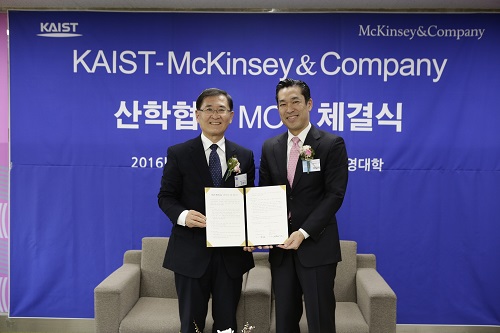 KAIST and McKinsey Korea Agreed to Cultivate Management Leaders
KAIST and McKinsey Korea signed a memorandum of understanding (MOU) for the “Joint Research on Innovative Instructional Method to Cultivate Future Management Leaders” on April 8, 2016, at the SUPEX Management Hall of KAIST Management School in Seoul.
Under the MOU, both organizations will cooperate in the following research areas: management strategies to overcome the low growth of Korean economy, instructional methods to foster leaders in the field of business and management, and innovative management systems for business.
President Kang said, “We are pleased to work with McKinsey, a worldwide management consulting firm, to foster leaders in science and business. As we see more demanding challenges of managing and leading science-based businesses today, this alliance is indeed timely and will be very helpful.”
2016.04.15 View 5926
KAIST and McKinsey Korea Agreed to Cultivate Management Leaders
KAIST and McKinsey Korea signed a memorandum of understanding (MOU) for the “Joint Research on Innovative Instructional Method to Cultivate Future Management Leaders” on April 8, 2016, at the SUPEX Management Hall of KAIST Management School in Seoul.
Under the MOU, both organizations will cooperate in the following research areas: management strategies to overcome the low growth of Korean economy, instructional methods to foster leaders in the field of business and management, and innovative management systems for business.
President Kang said, “We are pleased to work with McKinsey, a worldwide management consulting firm, to foster leaders in science and business. As we see more demanding challenges of managing and leading science-based businesses today, this alliance is indeed timely and will be very helpful.”
2016.04.15 View 5926 -
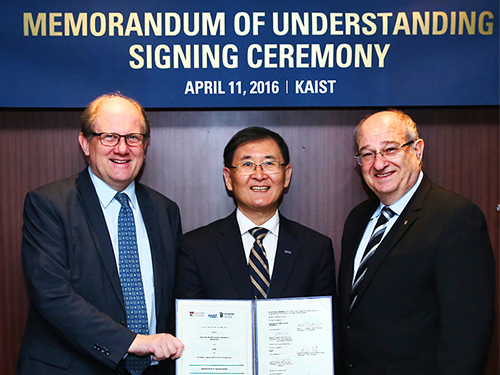 KAIST, NTU, and Technion Collaborate for Research in Emerging Fields
KAIST, Nanyang Technological University (NTU) of Singapore, and Technion of Israel signed an agreement on April 11, 2016 in Seoul to create a five-year joint research program for some of the most innovative and entrepreneurial areas: robotics, medical technologies, satellites, materials science and engineering, and entrepreneurship. Under the agreement, the universities will also offer dual degree opportunities, exchange visits, and internships.
In the picture from the left, Bertil Andersson of NTU, Sung-Mo Kang of KAIST, and Peretz Lavie of Technion hold the signed memorandum of understanding.
2016.04.14 View 11982
KAIST, NTU, and Technion Collaborate for Research in Emerging Fields
KAIST, Nanyang Technological University (NTU) of Singapore, and Technion of Israel signed an agreement on April 11, 2016 in Seoul to create a five-year joint research program for some of the most innovative and entrepreneurial areas: robotics, medical technologies, satellites, materials science and engineering, and entrepreneurship. Under the agreement, the universities will also offer dual degree opportunities, exchange visits, and internships.
In the picture from the left, Bertil Andersson of NTU, Sung-Mo Kang of KAIST, and Peretz Lavie of Technion hold the signed memorandum of understanding.
2016.04.14 View 11982 -
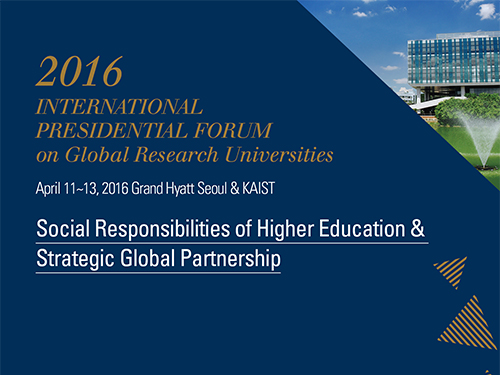 KAIST Hosts the 2016 IPFGRU
More than 120 senior representatives from 65 universities around the world will convene this month in Seoul to discuss the social responsibilities of higher education and strategic global partnerships among academia, research, and industry to advance socio-economic values.
Higher education as a driver of change to address the social and global challenges facing humanity in the 21st century has never been as important as it is today.
KAIST will raise the topic of higher education as a driver of social change, innovation, and entrepreneurship with the heads of global universities at its seventh international forum to be held on April 11-12, 2016 at the Grand Hyatt Hotel in Seoul, the Republic of Korea.
The 2016 International Presidential Forum on Global Research Universities (IPFGRU) will bring over 120 presidents and vice presidents of 65 research universities and institutes from 36 nations together to discuss the theme of “Social Responsibilities of Higher Education and Strategic Global Partnership.”
Presidents Sung-Mo Kang of KAIST, Jacques Biot of École Polytechnique in France, and Peretz Lavie of the Technion-Israel Institute of Technology will address the conference as plenary speakers.
President Kang will speak about KAIST’s initiatives to produce creative talents through student-centered education, entrepreneurship curricula, and the integration of humanities into cutting-edge research programs. His presentation, titled “The Fostering of Creative Talents and the Social Responsibility of Research Universities in the New Era,” introduces KAIST’s educational philosophy which can be represented as π. A broad range of understanding in basic disciplines (the horizontal line) is supported with one prong of in-depth knowledge in a chosen field and the other in entrepreneurial spirit.
KAIST graduates have demonstrated extraordinary leadership in research, academia, business, and public service. Nearly 25% of the research and development personnel at Samsung Electronics are KAIST Ph.D. holders. President Kang also describes KAIST’s latest endeavor to turn a university-led entrepreneurial activity into a stable business based on research outcomes and campus innovations. The K-School, a one-year master’s degree program on entrepreneurship and innovation, has just launched and is expecting to receive its first batch of students this fall. The K-School is envisioned to continue the university’s legacy as a major feeder for startups in Korea.
President Lavie will give a talk on “Fostering an Innovation and Entrepreneurship (I&E) Ecosystem in Israel,” in which he describes how the Technion-Israel Institute has become integral to the foundation of the nation’s I&E platform. Since its establishment in 1912, the university has become a key player in the growth of Israel’s industry, science, and technology while nurturing the majority of the nation’s top-notch researchers, innovators, and entrepreneurs. Technion graduates have created more than 2,000 companies in Israel alone, generating 100,000 jobs and USD 30 billion through mergers and acquisitions.
President Biot will offer his insights into how the future of global research universities will be widely impacted by the emergence of disruptions triggered by the Fourth Industrial Revolution. In his speech entitled “How to Prepare Our Universities for the New Era of Industry 4.0,” he emphasizes that universities should take multi-disciplinary approaches to tackle societal challenges given the complexity of today’s problems ranging from climate change to energy crises, pandemic diseases, and poverty. He argues that universities should identify the needs of students in “Generation Z” who, from birth, have been heavily exposed to the Internet and digital technologies and, thus, universities should develop new educational systems (i.e., University 4.0.) to better prepare these students to cope with Industry 4.0.
The IPFGRU consists of presentations and discussions addressing the following sub-topics:
- Seeking a New Model of Research Universities in a New Era: This session will explore the role of research universities as both innovation drivers and growth engines in an age of robotics, globalization, and digitally-driven markets. In addition, speakers will discuss how to prepare universities for the Industry 4.0 era, and how multidisciplinary approaches and open innovations will play a large part in facilitating translational research and technology transfer.
- Shared Challenges and Responsibilities from a Global Perspective: Universities will share their strategies, policies, and practices to respond to critical issues facing local and global communities such as youth unemployment, the environment, energy, inequality, and entrepreneurship.
- Strategic Global Partnerships for Sustainable Development: Panelists will discuss how to build productive and sustainable partnerships that can generate synergies between education and research.
- Insights into Higher Education: Trends and Development: Participants will examine how universities can stay relevant in an increasingly competitive higher education sector and can assist students to better adapt to opportunities and challenges posed by the new industry of digital transformation and exponentially-growing technologies.
Sung-Hyon Myaeng, the Associate Vice President of the International Office at KAIST and a Co-chair of the 2016 IPFGRU said,
“The IPFGRU was established in 2008 to promote excellence and innovation in higher education with presidents of leading research universities and key policy-makers in the private and public sectors from across the world. Since then, it has served as one of the largest university gatherings in Asia, allowing participants to cooperate and share their expertise, ideas, and best practices taking place in academia, industry, and government.”
“This year’s meeting has recorded the largest number of universities participating, including 28 European schools, 20 Asian institutions, and 8 schools from the Americas, which I believe reflects a sense of urgency that global universities share. One way or another, we must adapt to the rapidly transforming educational and research environment encompassing higher learning,” added Myaeng.
For more information, go to http://forum.kaist.ac.kr.
2016.04.08 View 9818
KAIST Hosts the 2016 IPFGRU
More than 120 senior representatives from 65 universities around the world will convene this month in Seoul to discuss the social responsibilities of higher education and strategic global partnerships among academia, research, and industry to advance socio-economic values.
Higher education as a driver of change to address the social and global challenges facing humanity in the 21st century has never been as important as it is today.
KAIST will raise the topic of higher education as a driver of social change, innovation, and entrepreneurship with the heads of global universities at its seventh international forum to be held on April 11-12, 2016 at the Grand Hyatt Hotel in Seoul, the Republic of Korea.
The 2016 International Presidential Forum on Global Research Universities (IPFGRU) will bring over 120 presidents and vice presidents of 65 research universities and institutes from 36 nations together to discuss the theme of “Social Responsibilities of Higher Education and Strategic Global Partnership.”
Presidents Sung-Mo Kang of KAIST, Jacques Biot of École Polytechnique in France, and Peretz Lavie of the Technion-Israel Institute of Technology will address the conference as plenary speakers.
President Kang will speak about KAIST’s initiatives to produce creative talents through student-centered education, entrepreneurship curricula, and the integration of humanities into cutting-edge research programs. His presentation, titled “The Fostering of Creative Talents and the Social Responsibility of Research Universities in the New Era,” introduces KAIST’s educational philosophy which can be represented as π. A broad range of understanding in basic disciplines (the horizontal line) is supported with one prong of in-depth knowledge in a chosen field and the other in entrepreneurial spirit.
KAIST graduates have demonstrated extraordinary leadership in research, academia, business, and public service. Nearly 25% of the research and development personnel at Samsung Electronics are KAIST Ph.D. holders. President Kang also describes KAIST’s latest endeavor to turn a university-led entrepreneurial activity into a stable business based on research outcomes and campus innovations. The K-School, a one-year master’s degree program on entrepreneurship and innovation, has just launched and is expecting to receive its first batch of students this fall. The K-School is envisioned to continue the university’s legacy as a major feeder for startups in Korea.
President Lavie will give a talk on “Fostering an Innovation and Entrepreneurship (I&E) Ecosystem in Israel,” in which he describes how the Technion-Israel Institute has become integral to the foundation of the nation’s I&E platform. Since its establishment in 1912, the university has become a key player in the growth of Israel’s industry, science, and technology while nurturing the majority of the nation’s top-notch researchers, innovators, and entrepreneurs. Technion graduates have created more than 2,000 companies in Israel alone, generating 100,000 jobs and USD 30 billion through mergers and acquisitions.
President Biot will offer his insights into how the future of global research universities will be widely impacted by the emergence of disruptions triggered by the Fourth Industrial Revolution. In his speech entitled “How to Prepare Our Universities for the New Era of Industry 4.0,” he emphasizes that universities should take multi-disciplinary approaches to tackle societal challenges given the complexity of today’s problems ranging from climate change to energy crises, pandemic diseases, and poverty. He argues that universities should identify the needs of students in “Generation Z” who, from birth, have been heavily exposed to the Internet and digital technologies and, thus, universities should develop new educational systems (i.e., University 4.0.) to better prepare these students to cope with Industry 4.0.
The IPFGRU consists of presentations and discussions addressing the following sub-topics:
- Seeking a New Model of Research Universities in a New Era: This session will explore the role of research universities as both innovation drivers and growth engines in an age of robotics, globalization, and digitally-driven markets. In addition, speakers will discuss how to prepare universities for the Industry 4.0 era, and how multidisciplinary approaches and open innovations will play a large part in facilitating translational research and technology transfer.
- Shared Challenges and Responsibilities from a Global Perspective: Universities will share their strategies, policies, and practices to respond to critical issues facing local and global communities such as youth unemployment, the environment, energy, inequality, and entrepreneurship.
- Strategic Global Partnerships for Sustainable Development: Panelists will discuss how to build productive and sustainable partnerships that can generate synergies between education and research.
- Insights into Higher Education: Trends and Development: Participants will examine how universities can stay relevant in an increasingly competitive higher education sector and can assist students to better adapt to opportunities and challenges posed by the new industry of digital transformation and exponentially-growing technologies.
Sung-Hyon Myaeng, the Associate Vice President of the International Office at KAIST and a Co-chair of the 2016 IPFGRU said,
“The IPFGRU was established in 2008 to promote excellence and innovation in higher education with presidents of leading research universities and key policy-makers in the private and public sectors from across the world. Since then, it has served as one of the largest university gatherings in Asia, allowing participants to cooperate and share their expertise, ideas, and best practices taking place in academia, industry, and government.”
“This year’s meeting has recorded the largest number of universities participating, including 28 European schools, 20 Asian institutions, and 8 schools from the Americas, which I believe reflects a sense of urgency that global universities share. One way or another, we must adapt to the rapidly transforming educational and research environment encompassing higher learning,” added Myaeng.
For more information, go to http://forum.kaist.ac.kr.
2016.04.08 View 9818 -
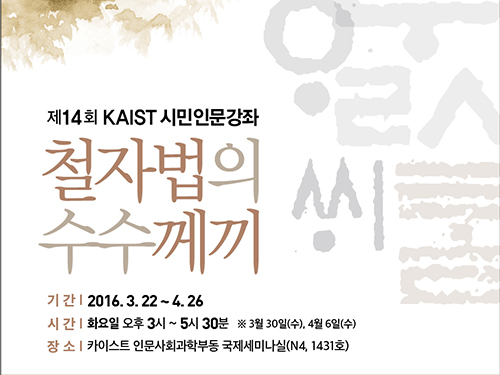 Public Lectures on the Korean Language and Alphabet
The School of Humanities and Social Sciences at KAIST will offer public lectures on the Korean language and alphabet, Hangul, from March 22, 2016 to April 26, 2016.
The lectures, which are entitled “The Riddle of Hangul,” will take place on campus in Daejeon.
A total of six lectures will be held on such topics as the origin of Korean, the grammar of ancient Korean in the Chosun Dynasty (1392-1897), and subsequent developments in contemporary Korean.
Professor Jung-Hoon Kim, who is responsible for organizing the public lecture program, said, “The audience will have an interesting opportunity to understand the history of Korean and its mechanism, while reviewing the unique spelling system of Hangul. I hope many people will show up for these wonderful classes.”
For further information and registration, please visit: http://hss.kaist.ac.kr. All lectures, available only in Korean, are free and open to the public.
2016.03.15 View 9218
Public Lectures on the Korean Language and Alphabet
The School of Humanities and Social Sciences at KAIST will offer public lectures on the Korean language and alphabet, Hangul, from March 22, 2016 to April 26, 2016.
The lectures, which are entitled “The Riddle of Hangul,” will take place on campus in Daejeon.
A total of six lectures will be held on such topics as the origin of Korean, the grammar of ancient Korean in the Chosun Dynasty (1392-1897), and subsequent developments in contemporary Korean.
Professor Jung-Hoon Kim, who is responsible for organizing the public lecture program, said, “The audience will have an interesting opportunity to understand the history of Korean and its mechanism, while reviewing the unique spelling system of Hangul. I hope many people will show up for these wonderful classes.”
For further information and registration, please visit: http://hss.kaist.ac.kr. All lectures, available only in Korean, are free and open to the public.
2016.03.15 View 9218 -
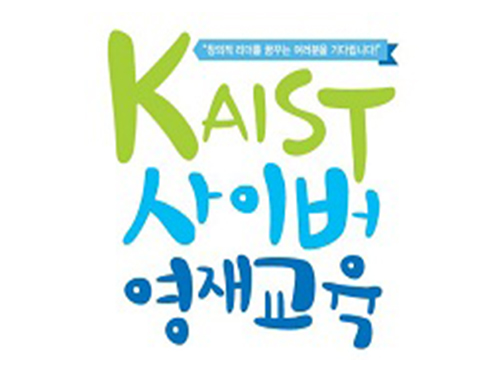 KAIST Offers Online Science Magnet High School Program
The Global Institute for Talented Education at KAIST has begun providing middle and high school students with in-depth online science education.
The institute receives applications until March 20, 2016. For details, please refer to the website: http://talented.kaist.ac.kr.
The program will run from March 21, 2016 to June 13, 2016.
Any middle and high school student can take courses on mathematics, science (physics, chemistry and biology), and information system (C language and Python computer language) based on their levels and needs. A total of 23 courses will be offered at the level of the first year of middle school to the second year of high school.
The online lecturers are drawn from science-magnet high schools nationwide. They will lead the classes to become more interactive with students, encouraging discussions and questions and answers.
KAIST students will also take part as tutors, helping the middle and high school students better understand the basic concept of the subjects they undertake and and to think creatively to solve problems.
About 500 top students will be chosen from the online course applicants to participate in a science camp hosted by KAIST during summer and winter vacations.
2016.03.14 View 5305
KAIST Offers Online Science Magnet High School Program
The Global Institute for Talented Education at KAIST has begun providing middle and high school students with in-depth online science education.
The institute receives applications until March 20, 2016. For details, please refer to the website: http://talented.kaist.ac.kr.
The program will run from March 21, 2016 to June 13, 2016.
Any middle and high school student can take courses on mathematics, science (physics, chemistry and biology), and information system (C language and Python computer language) based on their levels and needs. A total of 23 courses will be offered at the level of the first year of middle school to the second year of high school.
The online lecturers are drawn from science-magnet high schools nationwide. They will lead the classes to become more interactive with students, encouraging discussions and questions and answers.
KAIST students will also take part as tutors, helping the middle and high school students better understand the basic concept of the subjects they undertake and and to think creatively to solve problems.
About 500 top students will be chosen from the online course applicants to participate in a science camp hosted by KAIST during summer and winter vacations.
2016.03.14 View 5305 -
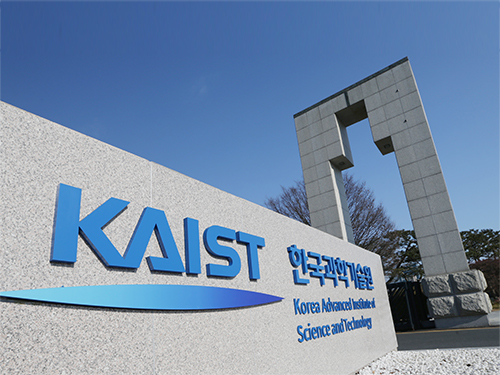 KAIST Identifies 27 Research Topics on Local Community
In tandem with the Korea Research Institute of Chemical Technology and Daejeon Civic Society Research Center, the Research Institute for Social Technology and Innovations at KAIST conducted a study on social challenges facing the local community and identified 27 research issues that could be solved with the help of science and technology.
The results of the study were released on March 10, 2016.
The research team prepared a report in an effort to encourage universities, research centers, and local citizens to cooperate in investigating social issues and finding their solutions.
The 27 issues were first chosen by pre-surveys and in-depth interviews with local citizens, and then discussed through public and expert workshops. Among the issues were environment, agriculture, energy, culture, public safety, family, and social integration. The team presented industrial complexes, agricultural facilities, and factories in rural areas were the most urgent issues of social concern within a city and province.
Hong-Gyu Lee, Director of the Research Institute for Social Technology and Innovations, said,
“The most serious problem that should be tackled in Daejon City is the chronic stench and garbage odor coming from industrial complexes, while environmental damages arisen from the development of new agricultural technology and factories are the major challenge in rural areas of Chungnam Province. This report is meaningful because citizens, universities, and research institutions worked together to find important issues related to the development of local community and explored solutions to solve those issues with the advancement of science and technology.”
2016.03.12 View 5307
KAIST Identifies 27 Research Topics on Local Community
In tandem with the Korea Research Institute of Chemical Technology and Daejeon Civic Society Research Center, the Research Institute for Social Technology and Innovations at KAIST conducted a study on social challenges facing the local community and identified 27 research issues that could be solved with the help of science and technology.
The results of the study were released on March 10, 2016.
The research team prepared a report in an effort to encourage universities, research centers, and local citizens to cooperate in investigating social issues and finding their solutions.
The 27 issues were first chosen by pre-surveys and in-depth interviews with local citizens, and then discussed through public and expert workshops. Among the issues were environment, agriculture, energy, culture, public safety, family, and social integration. The team presented industrial complexes, agricultural facilities, and factories in rural areas were the most urgent issues of social concern within a city and province.
Hong-Gyu Lee, Director of the Research Institute for Social Technology and Innovations, said,
“The most serious problem that should be tackled in Daejon City is the chronic stench and garbage odor coming from industrial complexes, while environmental damages arisen from the development of new agricultural technology and factories are the major challenge in rural areas of Chungnam Province. This report is meaningful because citizens, universities, and research institutions worked together to find important issues related to the development of local community and explored solutions to solve those issues with the advancement of science and technology.”
2016.03.12 View 5307 -
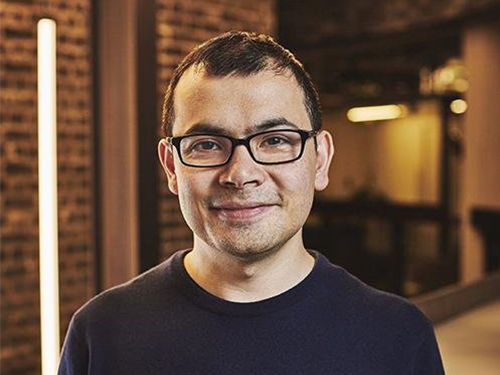 Dr. Demis Hassabis, the Developer of AlphaGo, Lectures at KAIST
AlphaGo, a computer program developed by Google DeepMind in London to play the traditional Chinese board game Go, had five matches against Se-Dol Lee, a professional Go player in Korea from March 8-15, 2016. AlphaGo won four out of the five games, a significant test result showcasing the advancement achieved in the field of general-purpose artificial intelligence (GAI), according to the company.
Dr. Demis Hassabis, the Chief Executive Officer of Google DeepMind, visited KAIST on March 11, 2016 and gave an hour-long talk to students and faculty. In the lecture, which was entitled “Artificial Intelligence and the Future,” he introduced an overview of GAI and some of its applications in Atari video games and Go.
He said that the ultimate goal of GAI was to become a useful tool to help society solve some of the biggest and most pressing problems facing humanity, from climate change to disease diagnosis.
2016.03.11 View 4870
Dr. Demis Hassabis, the Developer of AlphaGo, Lectures at KAIST
AlphaGo, a computer program developed by Google DeepMind in London to play the traditional Chinese board game Go, had five matches against Se-Dol Lee, a professional Go player in Korea from March 8-15, 2016. AlphaGo won four out of the five games, a significant test result showcasing the advancement achieved in the field of general-purpose artificial intelligence (GAI), according to the company.
Dr. Demis Hassabis, the Chief Executive Officer of Google DeepMind, visited KAIST on March 11, 2016 and gave an hour-long talk to students and faculty. In the lecture, which was entitled “Artificial Intelligence and the Future,” he introduced an overview of GAI and some of its applications in Atari video games and Go.
He said that the ultimate goal of GAI was to become a useful tool to help society solve some of the biggest and most pressing problems facing humanity, from climate change to disease diagnosis.
2016.03.11 View 4870 -
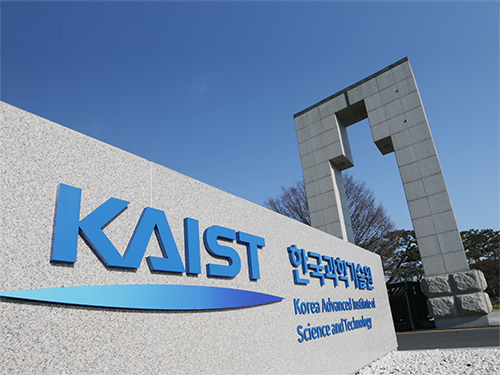 KAIST Ranks Third in the World's Top Universities for Attracting Industry Funding
The Times Higher Education released its World University Rankings online, naming the 20 best institutions that secured the largest amount of research funding from the private sector, on March 8, 2016.
The rankings were based on the 2013 record of industry-sector investments made per academic of an institution.
According to the list, KAIST ranked third with a figure of $254,700.
Germany’s Ludwig Maximilian University (Munich) took first place ($400,000), while the United State’s Duke University placed second ($290,000).
For a full list of the rankings, go to https://www.timeshighereducation.com/world-university-rankings/funding-for-innovation-ranking-2016.
2016.03.08 View 3932
KAIST Ranks Third in the World's Top Universities for Attracting Industry Funding
The Times Higher Education released its World University Rankings online, naming the 20 best institutions that secured the largest amount of research funding from the private sector, on March 8, 2016.
The rankings were based on the 2013 record of industry-sector investments made per academic of an institution.
According to the list, KAIST ranked third with a figure of $254,700.
Germany’s Ludwig Maximilian University (Munich) took first place ($400,000), while the United State’s Duke University placed second ($290,000).
For a full list of the rankings, go to https://www.timeshighereducation.com/world-university-rankings/funding-for-innovation-ranking-2016.
2016.03.08 View 3932 -
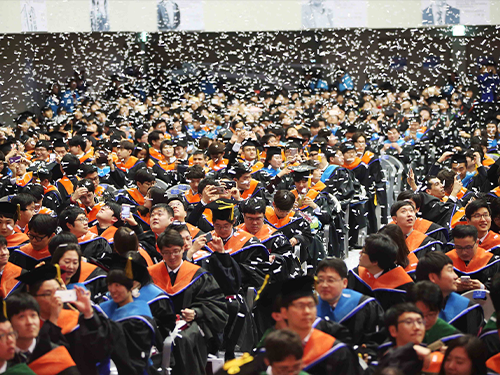 KAIST Commencement 2016
KAIST hosted its 2016 commencement ceremony on February 19, 2016 at the Sports Complex on campus.
KAIST celebrated the event with five thousand participants including graduating students, faculty, guests, Vice Minister Nam-Ki Hong of Science, ICT and Future Planning of Korea, Chairman Jang-Moo Lee of KAIST's Board of Trustees, and President Jeong-Sik Ko of the KAIST Alumni Association.
President Patrick Aebischer of the Swiss Federal Institute of Technology in Lausanne (EPFL), Switzerland, and the former Speaker of the National Assembly of Korea Chang-Hee Kang received honorary doctorates in science and technology for their contributions to the advancement of science and engineering in education and research.
KAIST granted 570 doctoral degrees, 1,329 master’s degrees, and 867 bachelor degrees on this day.
Yoon-Bum Lee of the Chemistry Department graduated with honors; Woo-Young Jin of the Mathematical Sciences Department received the Chairman’s Award of the KAIST Board and Eun-Hee Yoo of the Biological Sciences Department for the KAIST Presidential Award. Min-Hyun Cho and Yoon-Seok Chang were recipients of the President’s Award of the KAIST Alumni Association and the President’s Award of the University Supporting Association, respectively.
President Steve Kang addressed the ceremony and congratulated the graduates, saying,
“Now, your task is to make significant contributions to your communities: be leaders in your fields and remain active members of society. Given your academic knowledge and vision for the future, I encourage you to dream big.”
2016.02.23 View 42543
KAIST Commencement 2016
KAIST hosted its 2016 commencement ceremony on February 19, 2016 at the Sports Complex on campus.
KAIST celebrated the event with five thousand participants including graduating students, faculty, guests, Vice Minister Nam-Ki Hong of Science, ICT and Future Planning of Korea, Chairman Jang-Moo Lee of KAIST's Board of Trustees, and President Jeong-Sik Ko of the KAIST Alumni Association.
President Patrick Aebischer of the Swiss Federal Institute of Technology in Lausanne (EPFL), Switzerland, and the former Speaker of the National Assembly of Korea Chang-Hee Kang received honorary doctorates in science and technology for their contributions to the advancement of science and engineering in education and research.
KAIST granted 570 doctoral degrees, 1,329 master’s degrees, and 867 bachelor degrees on this day.
Yoon-Bum Lee of the Chemistry Department graduated with honors; Woo-Young Jin of the Mathematical Sciences Department received the Chairman’s Award of the KAIST Board and Eun-Hee Yoo of the Biological Sciences Department for the KAIST Presidential Award. Min-Hyun Cho and Yoon-Seok Chang were recipients of the President’s Award of the KAIST Alumni Association and the President’s Award of the University Supporting Association, respectively.
President Steve Kang addressed the ceremony and congratulated the graduates, saying,
“Now, your task is to make significant contributions to your communities: be leaders in your fields and remain active members of society. Given your academic knowledge and vision for the future, I encourage you to dream big.”
2016.02.23 View 42543 -
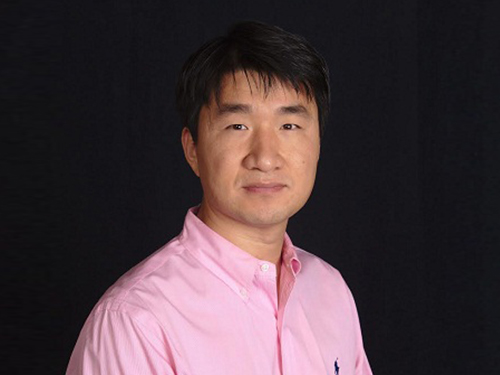 KAIST Graduate Han Receives a 2016 PECASE Award
President Barack Obama of the United States (US) announced 105 recipients of the 2016 Presidential Early Career Awards for Scientists and Engineers (PECASE) on February 18. Among the awardees was a graduate from the Department of Electrical Engineering at KAIST.
Dr. Jin-Woo Han has worked as a research scientist at the National Aeronautics and Space Administration (NASA) Ames Research Center since graduating from KAIST in 2010. This year, he is the only awardee who received a doctoral degree from a Korean university to become a recipient of the highest honor bestowed by the US government on science and engineering professionals in the early stages of their independent research careers.
The awards ceremony will take place in early spring at the White House in Washington, D.C.
Dr. Han has been involved in the development of radiation tolerant semiconductor devices as well as radiation and gas sensors under Dr. Meyya Meyyappan, Chief Scientist of the Center for Nanotechnology at NASA Ames Research Center.
KAIST and the NASA Ames Research Center made a research collaboration agreement in 2008, under which KAIST has sent 12 post-doctoral fellows to the center to date.
The PECASE awards, established in 1996 by President Bill Clinton, are coordinated by the Office of Science and Technology Policy within the Executive Office of the US President. Awardees are selected for their pursuit of innovative research at the frontiers of science and technology and their commitment to community services as demonstrated through scientific leadership, public education, or community outreach.
2016.02.23 View 10068
KAIST Graduate Han Receives a 2016 PECASE Award
President Barack Obama of the United States (US) announced 105 recipients of the 2016 Presidential Early Career Awards for Scientists and Engineers (PECASE) on February 18. Among the awardees was a graduate from the Department of Electrical Engineering at KAIST.
Dr. Jin-Woo Han has worked as a research scientist at the National Aeronautics and Space Administration (NASA) Ames Research Center since graduating from KAIST in 2010. This year, he is the only awardee who received a doctoral degree from a Korean university to become a recipient of the highest honor bestowed by the US government on science and engineering professionals in the early stages of their independent research careers.
The awards ceremony will take place in early spring at the White House in Washington, D.C.
Dr. Han has been involved in the development of radiation tolerant semiconductor devices as well as radiation and gas sensors under Dr. Meyya Meyyappan, Chief Scientist of the Center for Nanotechnology at NASA Ames Research Center.
KAIST and the NASA Ames Research Center made a research collaboration agreement in 2008, under which KAIST has sent 12 post-doctoral fellows to the center to date.
The PECASE awards, established in 1996 by President Bill Clinton, are coordinated by the Office of Science and Technology Policy within the Executive Office of the US President. Awardees are selected for their pursuit of innovative research at the frontiers of science and technology and their commitment to community services as demonstrated through scientific leadership, public education, or community outreach.
2016.02.23 View 10068